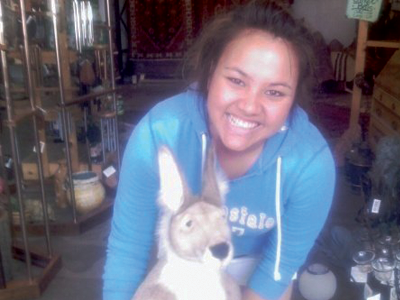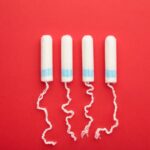Candid Conversations on Intimate Care Products
 Maria Ignacia Miranda Santis Program and Outreach Manager |
Maria's Story
I was born and raised in Chile and moved to the U.S. two days after my 12th birthday. About a year before that, when I was 11 years old, my mama took me to the doctor (a friend of the family) because my breasts were starting to grow, and I was starting to go through puberty.
At some point between that first appointment and before moving to the U.S., I went back for a check-up because I was experiencing what I thought was strange discharge on my underwear, and the first question my doctor asked me was “Te estas lavando la vagina con jabon?” (‘Are you washing your vagina with soap?’). I wasn’t, and we concluded that the discharge was just a normal thing for my body, and she recommended I use panty liners if I didn’t want my underwear to get dirty. I clearly remember her emphasis on staying away from douches, washes, wipes, and cleansers such as Summer’s Eve and Vagisil products. She said that if I needed to clean my vulva, that I could just use water, and that if I was ever itchy or noticed a strange odor that I should go to the doctor’s because it could be an infection.
To this day I’ve never used cleansing products such as Summer’s Eve or Vagisil or even soap. Just water every time I shower.
However, the thought has crossed my mind.
The older I get (I’m 26 at the moment), the more I notice different odors that my body and my vulva emit on different days. Most of the time I don’t notice any vaginal smells, but I know I smell differently after sex, while I’m sweating, after the pool, and even during different stages of my cycle (yes, I can tell I’m ovulating or going to start my period based on the way my vulva smells and discharge, among other symptoms). And sometimes these smells get to my head, and I start to think “maybe I should go buy a cleanser that smells like ‘tropical nights’ (whatever that means) so I don’t smell like this”.
YES! Sometimes I think about buying vaginal cleansers AND I WORK AT WVE! I get it. We’re told by society, our peers, family members, and people without vaginas that we smell, and this is usually accompanied by scrunched noses.
But here’s the thing, IT’S NORMAL TO SMELL. We’re human beings, we’re living things, we’re animals, and it’s normal to smell – generally.
Getting used to the way your body, your vagina, and your vulva smell is beneficial for your overall health. Knowing what you normally smell like (or don’t smell like) can give you a better sense and understanding of when the odor is strange and could potentially be an infection.
If you always smell like roses because you use cleansers, and then suddenly you don’t smell that way, how do you know it’s the way your vulva naturally smells or if it’s something serious like bacterial vaginosis or a yeast infection?
Not to mention that it could be the ingredients in these cleansers that are leading to increased rates of vaginal irritation, discomfort, and vaginosis. There’s not a lot or enough research on this, but, as our Director of Science and Research, Alex Scranton mentions in this blog, “the body of evidence… supports a valid reason for concern – and they justify the dire need for more investigation.”
 Zonya Dawson Digital & Communications Coordinator |
Zonya's Story
I’ll be the first to admit I don’t really know much about my body. Sure, I know when I am hungry, or angry or if too many days have gone by without a hair wash or a shower but, I unlike so many of my peers, I had never taken the time to learn about my body.
I was raised in a conservative, somewhat religious household, and was never taught about my body. Not, sex education until I moved to the U.S. and attended public school in 10th grade. I was never taught about my body - yes, I was constantly told to be thin, and always smell good, I was taught to do my hair and makeup and dress well, but my mother, 7 aunts, and countless cousins never spoke to me about vaginal “hygiene”.
When I first got my period at 13, I googled how to use a pad, and even today at 29 years old, I am too “fearful” to use tampons.
At 17 years old, my senior year of high school, I started becoming intimate with my then boyfriend. That was when I was first introduced to wipes, cleansers, and douches – by the internet. Article after article droned on about the importance of “freshness”, “smelling like a rose”, and an overwhelming sense of – “if I don’t wash with THIS cleanser, and wipe with THIS brand, and douche with THIS tool, my boyfriend will think I am gross and smelly and leave me!” So being 17, I drove over to Target and spent over $75 of my hard-earned tip money in the “feminine hygiene” aisle. From that moment on I used wipes and cleansing wash religiously – during my daily shower I would use the cleansers, after school and before work I would use the wipes, and before seeing my boyfriend - it was a combination of cleansers, wipes, and a couple spritz of my favorite perfume.
From the ages of 17 – 21 this was my process, driven entirely by my need to be “fresh” and “clean” for my partners. Before this process began, I never once felt “smelly, ‘down there’” or had any itching or other concerns. I was a dancer and golfer and was constantly sweaty, I just thought a good shower was all I needed, and I was right – until I started ‘self-educating’ online.
At 21, I decided I was ready for prescription birth control and visited a local planned parenthood. The doctor asked about my sexual history and asked if I had any pain or discomfort to share. I said, I had been experiencing itching and dryness and wasn’t sure of the cause. She asked about my worry for STIs and asked if I used any cleansers or wipes. I said yes to both and began to panic. She suggested an STI test and in that moment my heart started to race, and when she suggested I stopped using my wipes and cleansers I nearly fell off my chair. The test came back negative, which can only mean I needed to stop using my beloved products.
A week had gone by without my products, and I was more self-conscious than ever. I found ways to avoid intimacy, I showered 3-4 times a day and drenched myself in perfume. But my itching started to subside, but I started to notice an odor, one that I assumed my products had help suppress. At that moment 2 weeks after I received medical advice to stop using wipes and cleansers, I asked myself what was worst – the itching, or the odor. I chose the odor and continued using the products.
At 25, I had had enough. The itching, irritation and dryness was unbearable. I made a conscious decision to stop using these products. After a couple weeks I did notice the itching and irritation had started to subside, but I couldn’t shake the odor… it wasn’t bad per se, it just existed.
As someone who used lots of washes and wipes in conjunction with perfume and deodorant and baby powder to mask ANY odor this was jarring. But this time I was older and wiser, and I took to the internet, the same place that once told me about the products and remedies, the same place that told me my ‘flower’ had to be smelling like rose or I would be single forever, this place was now filled with article after article of side effects, why you shouldn’t use talc-based baby powder near your vagina (or anywhere), and countless YouTube videos breaking myths.
I realized I had a lot of unlearning to do after years of toxic marketing.
At 29 and working with an organization whose works is educating community on the harm these product cause both mentally and physically every now and again I am tempted by these wipes and cleansers. I trick myself (let’s be honest corporations’ marketing teams are tricking me), that it is somehow different now. They have changed their formulas, and I am older now and my body is once again changing and ready for these products.
Our Story
The intent of us sharing our stories is not to shame anyone who using these products.
Companies are constantly telling women to use extra products to be more attractive because the way they are is not enough. This is further proved by the lack of penis and testicular cleansers offered and marketed toward men. Vaginal cleansers are also heavily marketed towards women of color, especially Black and Latinx women because our society and companies enjoy telling women of color that they are dirty and they smell. And, unfortunately, we can’t get rid of this racist and sexist shaming overnight.
If you want to continue to use cleansers, washers, wipes, and douches, we don’t want to shame you into stopping. But one thing is for sure, however we choose to take care of our bodies, products must be safe, should never contain chemicals of concern, and should not put our health at risk.
We believe the elixir is 3-fold:
1. We (those who have used or are tempted to use these products) must speak openly about why we use these products; we must share stories and create judgement free spaces. We must educate one another on when our bodies are being completely ‘normal’ and when we might have to visit a doctor, while fully acknowledging the shame that might have led us to these products in the first place.
2. We must hold the makers of these products accountable. For putting harmful toxics in our products, for their harmful marketing and for their deceiving practices. We want companies to stop using toxic ingredients that lead to allergic reactions, irritations, and potentially long-term health impacts, for the sake of people choosing to use these products these products must be made as safe as possible.
3. We want companies to stop racially marketing these products as solutions to women of color who already have increased cases of “bacterial vaginosis and more frequently report using douche[s] and other intimate care products”.







I am a 73 yr old mom, grandma, & great-grandma of a 10 yr., retired but an active senior who is passionate about informing and educating young girls and women about the harmful, disruptive, hidden toxins and chemicals in personal feminine hygiene menstrual sanitary napkins and tampons. As a Justice for my Jewel Awareness Advocate, I can share a healthy, non-toxic, non-plastic, non-chemical, alternative that will provide young girls and women with comfort, dryness, odor free & kills harmful bacteria on contact. Our pads are biodegradable, so there isn’t a carbon foot print left behind from use of our product in the environment. We ask females to make the switch to a healthier menstrual lifestyle choice and an end to period shameing, and period poverty!!!